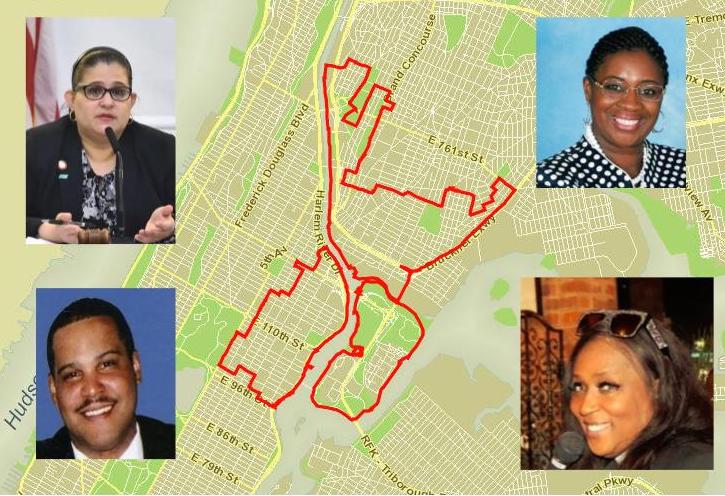Big differences in money raised for the campaign separate the candidates in the 8th district, which includes neighborhoods in Manhattan and the South Bronx.

NYC GIS, NYC Council, NYC CFB, Glover & Onativia campaigns
The 8th Council District and the four candidates vying in its Democratic primary, clockwise from top left: incumbent Diana Ayala, Manuel Onativia, Antoinette D. Glover and Tamika Map.This story is part of a City Limits’ series on the 2021 City Council races in partnership with Gotham Gazette, City & State and the Queens Daily Eagle. To read more, visit our Council Countdown page.
The 2021 primary elections are just around the corner, and when it comes to City Council races, the spotlight is on the 28 seats (26 held by Democrats and two by Republicans) for which there are open races thanks to term limits. However, in the city’s other 23 districts, incumbents are seeking reelection, and some of them also face primary challenges. Such is the case in District 8, where Diana Ayala is seeking a second term against three candidates: Antoinette D. Glover, Tamika Mapp and Manuel Onativia.
Ayala was born in Puerto Rico and has worked in the community for more than 20 years. She worked as a senior-center director in East Harlem and then moved on to join former City Councilmember and Speaker Melissa Mark-Viverito, for whom she worked for more than a decade, first as constituent services director and later as deputy chief of staff.
Ayala came to office after winning the election in 2017 to fill the position formerly held by her boss, Mark-Viverito. During the 2017 primary election, Ayala faced and defeated Assemblymember Robert Rodriguez, Israel Martine and Mapp. The margin was close. Ayala netted 43.5 percent of votes, while Rodriguez received 42.2 percent, giving Ayala the nomination with less than 150 votes difference between the two. Then, she easily won the general election in the heavily Democratic district.
In the 2017 primary, Mapp came in third place, taking 9.7 percent of the vote and receiving less than 1,000 votes. In 2020, Mapp and Rodriguez competed for New York’s 68th district state Assembly seat. Rodriguez won, though Mapp got more than 5,500 votes, so if she can turn out a similar number of voters, this year’s Council primary might be a competitive race again.
But fundraising could be the stumbling block for three candidates. Mapp, for example, has raised $4,352, she says by phone, a few dollars more from what New York City Campaign Finance Board registry shows ($4,189).
Onativia says he is raising no money. “I’m not part of the matching program,” he says by phone and adds that he is going old school, giving out some flyers and knocking on doors. Glover is similarly not registered with the city’s campaign-finance system. Neither Glover nor Onativia have an online platform.
Ayala’s records show $48,760 dollars raised, so she’ll receive NYCCFB’s matching funds. While Ayala’s war chest is not large—a fellow Council incumbent, Rafael Salamanca, has hauled in 13 times as much—it does put Mapp at a 10:1 financial disadvantage.
“I started fundraising in February [2021]. There are a total of 97 contributions, 36 of them from our district,” says Mapp, who believes she will be able to compete despite not having a lot of funds. Onativia is also hoping to get similar numbers as in 2020, when he got 2,482 votes to be the Male District Leader in the 68th Assembly District.
Glover also ran in 2020 to be the Female District Leader in the 68th Assembly District, but after her mother died due to COVID-19, “I quit. I forgot I was on the ballot,” she says by phone. She came in fourth place with 1,399 votes.
Glover is a pastor at what she calls Universal Soul Saving Church Of Jesus Christ, a church with no temple or specific location since she is doing street ministering. “I go wherever I’m invited or people congregate on streets,” she says. Glover is running because she sees a lack of investment in East Harlem, where she has seen politicians of all kinds parachuting in to take pictures giving out food, or making campaign promises, and then disappear.
“I want NYCHA to start educating their tenants about all resources available for them,” Glover says. To lower crime and gun violence in the area she would like to see police officers on the ground again and “bring the PSA [police service area] precinct back to NYCHA houses,” but also to “bring the social workers to deal with mental health issues, and the Department of Homeless Services to deal with homeless.”
Onativia, for his part, has worked the last 15 years getting contracts as a consultant worker for landscaping. His campaign proposal tackles two areas: NYCHA and getting young people off the streets and out of gangs.
On NYCHA, Onativia would like to clean up and restore public housing, and come up with a better way to manage the garbage piling up in NYCHA buildings. He plans to get kids off the street by offering a cash-bonus reward to those who enlist in a program and complete six months without receiving unemployment assistance, so the worker would “receive $1,500 after three months, and then $1,500 after six months,” he explains.
Mapp is the founder and CEO of East Harlem Insurance Brokerage and Tax Service. She served in the military, was a Girl Scout, and is now a Democratic State Committeewoman and County Committeewoman.
Mapp’s platform focuses on housing, opposing NYCHA’s Blueprint for Change and changing the way the city calculates the Area Median Income upon which rents in affordable-housing developments are based; currently, under federal law, AMI for New York City is based on regional data that skews it higher.
Manhattan/Bronx District 8 is one of only two of the 51 Council districts that covers parts of two boroughs (Brooklyn/Queens District 34 is the other). Ayala’s district includes neighborhoods such as East Harlem (also known as El Barrio), Mott Haven, Highbridge, Concourse, Longwood, and Port Morris. Housing is a primary concern across the district. In East Harlem, Community Board 11 has called attention to the lack of affordable rents as 38.3 percent of households in the area spend 35 percent or more of their income on rent, with gentrification a constant threat to driving low-income people out of the area.
According to Afua Atta-Mensah, executive director of Community Voices Heard, the big problem in District 8 is “access to real housing opportunities in the area,” she says by phone.
The other big issue she stresses is education. The district is home to many essential workers, Atta-Mensah explains, and many of them faced the problem of choosing online schooling for their children to avoid contagion while worrying about not receiving the same quality of education and thus lagging behind.
On education, Mapp advocates for financial literacy and civics classes for all grades, as well as increasing the voucher for family childcare providers and making the internet a public utility.
Mapp also says she supports the Green New Deal for New York City and wants greater access to community gardens. She says one of the most personal points on her agenda is disability justice. On this, she proposes that City Council and Community Board have video captions and American Sign Language (ASL) during meetings.
Ayala, on the other hand, has said she is seeking re-election because she wants to continue fighting for the community as it recovers from the pandemic, keep up the fight against the opioid crisis, and bring awareness to mental health.
According to city data, overdose deaths increased during the first quarter of 2020, following a trend that was seen nationally. Overdose rates among South Bronx and East Harlem residents were among the highest in the city. For example, in neighborhoods such as Highbridge and Morrisania (which is not part of District 8) and Mott Haven and Hunts Point (which is also not part of the district), the rate of overdose deaths per 100,000 population was double the city’s average of 21.2.
In her first Council term, Ayala rose quickly and earned a leadership position as co-chair of the progressive caucus. She is the current chair of the Council’s consumer affairs and business licensing committee. She has also been heavily criticized since 2018 for voting in favor of building a jail in Mott Haven in the South Bronx as part of de Blasio administration’s plan to close Rikers Island.
Unlike other councilmembers like Stephen Levin (of Brooklyn), Margaret Chin (of Manhattan), and Karen Koslowitz (of Queens) who supported jail construction in their boroughs, Ayala is the only representative of that group seeking re-election this year, and the hot-button issue is likely to resurface again as the city moves forward with its plans for the four new borough-based jails, which are now expected to be completed by 2027.
Mapp has said that she would take community-based jails out of the neighborhood and wants to fight unemployment by promoting the raising of the city’s minimum wage to $20 an hour (which would require a change in state law). If elected, she would have a multilingual staff able to speak Spanish, French, Creole and Chinese, and would have an immigration consultant, she says. Finally, Mapp says she is enthusiastic about giving voting rights to immigrants living in the city, a divisive point that has gained traction in NYC’s mayoral race.
Ayala has sponsored 46 pieces of legislation during her three-plus years in the Council, including proposals relating to Access-a-Ride’s use of bus lanes, police handling of mental-illness episodes, transparency about injuries in public housing, community gardens and pesticide use. Fourteen of her bills have become law, among them measures that addressed burial assistance, made provisions for gender non-conforming people and combated age- and source-of-income discrimination. Additionally, Ayala has presented a resolution calling on Congress to pass, and the president to sign, the Puerto Rico Self-Determination Act of 2020.
Council Countdown is a partnership among City Limits, City & State, Gotham Gazette and The Queens Daily Eagle offering coverage of the 2021 New York City Council races.










6 thoughts on “Four Candidates Vie For City’s 8th District, One Seeks Re-election”
Tamika Mapp constant run for different positions in state, city, and committees looks like she’s throwing anything at the wall to see what sticks.
Candidates should take time to develope a platform. ie: security before unity courtesy for kinship , public housing, harm reduction , mental health inclusive of health in general. These are areas most impacting on El Barrio.
Tamika is running because we have Diana Ayala, one of the worst city council members in all of NYC, representing us:
1. She’s building a jail in our borough
2. She has done nothing on affordable housing
3. She has no plans to aid our suffering small businesses in the wake of the pandemic
Tamika has been around and Diana is nowhere to be found. I voted for her last year and I’m happy to vote for her again.
Sidewalks are full of trash and dog poop too.
TAMIKA MAPP is the ONLY City Council candidate that supports…
– Green New Deal
– Making the internet a public utility
– Restoring hard-hit sanitation services
– Reversing efforts to constructing a big city jail in Mott Haven
ON JUNE 22, VOTE TAMIKA MAPP FOR DISTRICT 8!
#EastHarlem #SouthBronx #VoteEarlyToo
I live in East Harlem and I’m saddened to see that no one is really discussing the African-American Puerto Rican experience, all I’m hearing about it what Puerto Ricans want to do for Puerto Ricans. Hopefully I’ll know who my sons and I will vote for.
Furthermore I’ve been to councilwoman Diana Ayala’s office and she has never been there, the staff there works and runs the place.